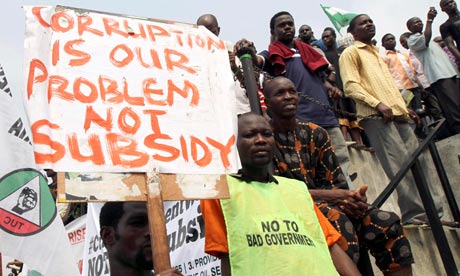 |
| From Guardian |
This is a global problem where politicians are in charge of selling the citizens' resources. Citizens have to watch their resources carefully.
In the USA, in the 1920's, a politician was convicted for accepting bribes from oil companies in return for oil leases. (Wiki on Teapot Dome scandal)
In Nigeria, there is a report in 2012 of how $35 billion oil revenue was lost.
"A top Nigerian anti-corruption crusader was asked to prepare a no-holds-barred report on the rotten state of country’s oil industry. He delivered. Nigerians now have a clear idea of just how much their government has squandered on inefficiency, mismanagement and personal bank accounts, and they’re not happy."The Guardian reported:
"The most damaging allegation involved the state oil firm and oil companies Shell, Total and Eni, which together owned a subsidiary company called Nigeria LNG. This company acted as a middle man, buying oil on the cheap from the government and selling it on to international markets at a vastly inflated price. Ribadu's report estimates that if the government had just sold the oil at market price, they would have made an additional $29-billion."There are international conferences dedicated to this global problem.
One example.
Citizens Against Corruption in Natural Resource Management, a 2008 workshop by IACC, International anti-corruption conference.
SummaryThis quote is from the report from Azerbaijan:
The exploitation of mineral deposits and oil both offer huge scope for corruption. This workshop explored practical ways to mobilize civil society organizations to fight corruption in the management of natural resources, drawing lessons from two case studies. The first case deals with the misappropriation of oil revenues in Azerbaijan while the second case addresses the situation where unscrupulous commercial operators bribe poorly paid local officials in Mongolia.
While the government has the main responsibility to manage the country’s oil revenues wisely and to account for its actions to the general public, this will not happen without effective public oversight. Thus, civil society -- broadly defined to include the independent media, business associations, research institutes and active individuals as well as advocacy NGOs -- can and must play a key role in demanding good governance and government must be persuaded to accept this oversight. (From Vugar Bayramov, Anti-corruption Initiatives in Oil Sector in Azerbaijan: Do Civil Society Organizations Matter?)
No comments:
Post a Comment